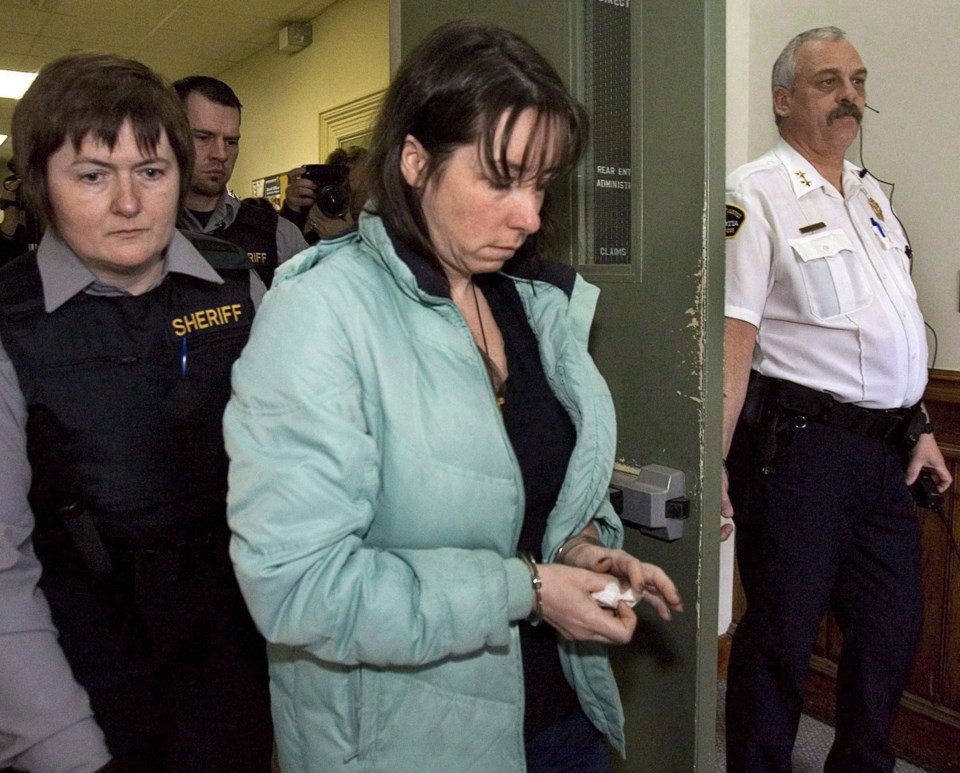TRURO — A Nova Scotia woman who murdered her 12-year-old daughter in 2008 has been granted an unescorted pass from prison for 60 days.
But the Parole Board of Canada denied Penny Boudreau's request Wednesday for day parole, saying she wasn't ready to live in a community for a more prolonged period with fewer restrictions.
In January 2009, Boudreau pleaded guilty to second-degree murder after admitting she had used a length of twine to strangle Karissa Boudreau on the night of Jan. 27, 2008. Court heard that the woman from Bridgewater, N.S., now in her 50s, wanted the girl out of the way because she was interfering with Boudreau's relationship with a boyfriend.
Boudreau was sentenced to 20 years in prison. But under federal law, she was allowed to apply for day parole or a so-called unescorted temporary absence (UTA) with three years left in her sentence.
Day parole can be granted for up to six months and is less restrictive than a UTA. In both cases, offenders must return at night to a supervised setting like a halfway house, but there is closer supervision and more restrictions for those on a UTA. Those on day parole, for example, can apply to leave unescorted for a weekend, but those on a UTA can't do that.
As the hearing in Truro, N.S., began Wednesday, Karissa's father, Paul Boudreau, read from a statement saying his daughter's death had left a huge void in his life.
"Am I a failure as a father? Should I have seen this coming?" he said. "This turmoil has lowered my self-worth to a very low point .... Life will never be the same for many of us."
The hearing, led by a two-member panel from the parole board, heard Boudreau had completed correctional programs and had received treatment from a mental health team while working as an assistant to the chaplain at the Nova Institution for Women in Truro.
"You've made good use of the time," a panel member said. "You've led a productive lifestyle."
As well, they were told Boudreau had been granted escorted day passes for the past seven years and participated in psychological risk assessments that determined she was at a very low risk to re-offend.
But the panel also heard she is considered a high risk for entering into unhealthy, intimate relationships.
Throughout the hearing, Boudreau spoke barely above a whisper. At times, she struggled to answer questions about how she would cope in certain situations. And she lost her composure several times, dabbing her eyes with a tissue as she sobbed.
When asked to reflect on the impact her actions have had on the broader community, she struggled to respond.
"A great deal of consideration went into the impact on the community," she said, drawing a deep breath. "I have talked about it with several people .... And I feel like people are going to be hurting .... I don't know if there's anything I could do to mitigate causing more hurt or anger."
She also mentioned how her unescorted day passes allowed for a gradual reintegration into society.
"It would have been overwhelming to do this too much," she said. "It's allowed me to be gradually hopeful that I can do this."
But when she was asked to rate her overall progress in prison on a scale from 1 to 10, she said she rated herself at 6 or a 7.
"That means there's still work to be done," a board member told the hearing as it drew to a close. "The board thinks you're very conscious of the work that needs to be done on relationships, managing emotions and dealing with obstacles that can be highly stressful."
The board member said Boudreau's limited criminal history was offset by the nature and severity of her crime.
"The impact of your crime cannot be overstated," he said. "This impact remains very much alive ... And the board remains very mindful of the protection of society."
The board members decided they would review Boudreau's case in six months.
They also said her UTA was conditional on her continuing with mental health treatment, avoiding contact with the victim's family and reporting any new relationships with men, and confirming whether they have parental responsibilities for anyone under 16.
When asked if she had any additional information to share, Boudreau sobbed again as she acknowledged that many people in Nova Scotia are still hurting because of her actions.
"I realize that I can't undo it. I just want it known that I don't take this lightly at all."
This report by The Canadian Press was first published June 18, 2025.
— By Michael MacDonald in Halifax
The Canadian Press



